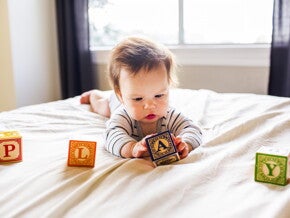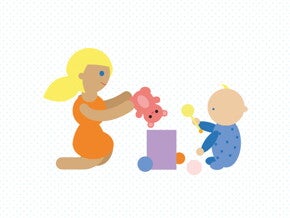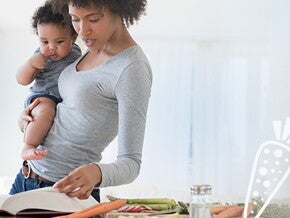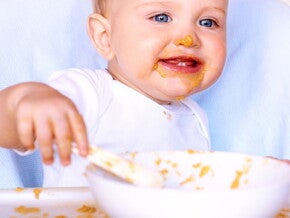
Teething Symptoms & Signs - What to Expect in Your Baby
The age your baby gets teeth varies greatly from child to child. For most, baby teeth begin erupting anywhere from 6 to 9 months of age. Teething can be a distressing time for you and your baby. We’ve put together a teething action plan to help you through these tough days and nights.
Although rare, your baby may even have a tooth or two at birth. For some children teeth start to appear around 4 months, occasionally some babies won’t have any until after the 12-month mark, but for most, baby teeth begin erupting anywhere from 6 to 9 months. Baby teeth usually erupt through the gums in pairs, one appearing a few days after the other. There is a sequence that baby teeth are expected to appear in, but don’t be surprised if teeth show up in any old order!
- The first teeth predicted to appear are the two lower middle incisors (the cutting teeth) followed by the two upper middle incisors;
- Next are the incisors on either side of these;
- The first back molars (the chewing teeth) are next to appear and may cause a little more pain and discomfort than earlier teeth;
- The four canines (the pointy teeth) come next;
- Followed by the other back molars, often referred to as ‘two-year-old molars’.
- This makes a whole mouthful of up to 20 teeth by the time your child is two – three years old.

Possible Signs of Teething
- Perhaps the first sign of a tooth emerging is when your baby is biting or gnawing a lot. They may chomp down on a finger when playing, or worse a nipple while having a breastfeed, Ouch!
- Your baby being a little clingier, grizzly, unsettled and generally miserable for a few days could be the sign of a tooth on the way;
- You may notice a clear nasal discharge and gums that are darker and puffier than usual;
- Your baby may experience pain and tug on their ear lobes, while others may have a slight fever (<38°C) only as teeth poke through the gums.
- Smelly, poo-filled nappies are more common when teething, as is angry, red nappy rash;
- If your baby is eating solids they may go off them for a while, but there’s no need to worry as the enjoyment of eating will soon return.
- If you are worried about any of your babies’ symptoms seek medical advice from your healthcare professional. This is especially important for fever or diarrhoea as these are not symptoms of teething.
If your baby feeds well, sleeps well and happily plays during the day, teething is unlikely to be the cause behind a disturbed night’s sleep. And while drooling is often attributed to teething, your baby does go through a developmental change at around three to four months of age where they’ll begin to drool, put fingers in their mouth or even try to shove a whole fist in! While drooling moistens the mouth ready for teething, it’s not necessarily a sign that baby teeth are imminent. Many times it’s just a case of wait and see.
While some babies may show all or some of the above symptoms, some will teethe with no signs or troubles at all.
Teething Tips & Remedies
Here are 4 popular ideas to try:
- Help your baby feel more comfortable by giving them cold drinks and foods such as cucumber or cold fruits – you can use a mesh baby food feeder if they’re too young to handle solid foods, which will still allow them the experience of gumming the cool relief;
- Cold teething rings are great for your baby to chew on, or rubbing their gums gently with a clean face washer that’s been slightly dampened and then cooled in the fridge or a clean finger;
- Provide your baby with a healthy, balanced diet and a settled day. A change of scenery or play might help take your baby’s mind off their troublesome teeth.
- There are many other ointments and remedies available for teething. It’s worth getting healthcare professional advice on how and where to use them, and if they’re safe to use at all. For example, teething gels are not recommended without healthcare professional advice as they can have ingredients that are not safe for babies.
Offer your baby extra cuddles and reassurance – mum and dad’s love is a great soother. If your baby is having a particularly bad day and can’t be comforted by any of these measures, try an anti-inflammatory or analgesic medication such as paracetamol, as advised and recommended by your healthcare professional.
Remember too, that all babies are different when it comes to what they need and when, so stay positive while you try to find a remedy that suits your baby.
Cleaning Baby Teeth
First teeth – 6 months:
Cleaning baby teeth should start as soon as the first teeth appear. In the beginning, clean your baby’s teeth and gums with your finger, a clean damp face washer or rubber finger cover.
Around 6 - 18 months:
When your baby is around 6 months old, change to a toothbrush with soft bristles and a small head. Use only water to brush your baby’s teeth.
18 months onwards:
When they turn 18 months start using a pea sized amount a low fluoride baby toothpaste. Baby toothpaste has less fluoride than adult toothpaste. You will need to assist with teeth cleaning in some way until your baby is big enough to be trusted to do it on their own, let’s hope that’s before they’re a teenager! Around 2 years, your child’s teeth may also start to touch. It’s now time to floss!
Tooth decay is commonly caused by food or drink (often milk or juice) settling around the teeth while your baby sleeps. At night there is less saliva produced to wash away sugar sediments, therefore when your baby has teeth it is important to clean their teeth before bed.
It is recommended to see a dentist as soon as your baby’s first tooth appears, or around 1 year, whichever comes first. So if you haven’t already, it might be time to give your dentist a ring!


















